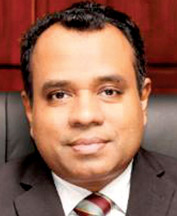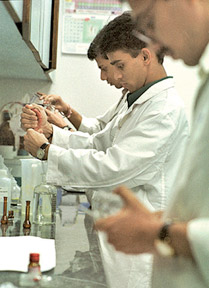|
Twelfth FERCAP conference in Colombo :
Medical ethics' committees to protect patients and volunteers
By Dhaneshi Yatawara
 |
|
Professor Vajira H.W.
Dissanayake |
The Nazi human experiments and mass murder under the guise of
euthanasia, when exposed at the Nuremberg trials, became the eye opener
for the world on the importance of ethics review in medical and
scientific research. Trials of War Criminals before the Nuremberg
Military Tribunals revealed to the world how researches could exploit,
harm and cause death to innocent people on the name of medical
advancement. Be it at war or in peace, research community of the world
understood the gravity of the necessity of having ethics and ethic
reviews for medical and scientific research. This paved the path to the
Nuremberg Code which is a set of research ethics, principles for human
experimentation set as a result.
An article written by a doctor by the name Henry Beecher in 1966 on
unethical practices in medical experimentation within the 'New England
Journal of Medicine' was instrumental in the implementation of federal
rules on human experimentation and informed consent. "Though the
understanding and guidelines were present at that time, there was no
such mechanism to glue the research to ethics reviews," said President
of the Sri Lanka Medical Association Professor Vajira H.W. Dissanayake,
who is also a steering committee member of the Forum for Ethics Review
Committees in Asia and the Western Pacific.
 During the Tuskegee syphilis experiment conducted in United States
between 1932 to 1972 it was revealed that the black men in this trial
were grossly neglected and unethical. Prompted by this problem the US
Government set up a National Commission and the outcome was the Belmonte
report named after the Belmonte Conference Centre where the Commission
first met when drafting the report, Prof. Dissanayake said, explaining
how ethics in research grew to where it stands today. "It was there that
the science world understood that researchers would need an
institutional mechanism to ensure that researchers in that institution
are working in an ethical manner," he said. During the Tuskegee syphilis experiment conducted in United States
between 1932 to 1972 it was revealed that the black men in this trial
were grossly neglected and unethical. Prompted by this problem the US
Government set up a National Commission and the outcome was the Belmonte
report named after the Belmonte Conference Centre where the Commission
first met when drafting the report, Prof. Dissanayake said, explaining
how ethics in research grew to where it stands today. "It was there that
the science world understood that researchers would need an
institutional mechanism to ensure that researchers in that institution
are working in an ethical manner," he said.
As a result various Committees were set up especially in the USA
which were called as institutional review boards or IRDs. "But when it
came to our part of the world we called them Ethic Review Committees. In
Sri Lanka the first Ethic Review Committee was set up in 1981 in the
Faculty of Medicine of the University of Colombo. We as a country have
identified this and have started very early but however the mechanism
really did not develop," Prof. Dissanayake said. "So although we started
early we were lagging behind," he added. In the 1990s the World Health
Organisation identified that there is a lot of research going on in the
Asia Pacific region and the developing countries and not much of ethic
reviews happening. Thus, they came up with Strategic Initiative for
Developing Capacity in Ethical Review or better known as SIDCER. This
initiative proposes to set up a regional forum to develop ethics'
committees. Such were established in all parts of the world and the
forum that was set up in Asia was Forum for Ethical Review Committees in
Asia and the Western Pacific (FERCAP) established in 2000 and based in
Thailand. "By establishing this sort of a set up, countries like
Thailand where they had no establishments for ethic reviews today have
excellent systems. On the other hand, Sri Lanka having a positive
history for ethical reviews was lagging behind in establishing the
institutional structure as there was nobody actually to lead it," he
said.
"Today where many are promoting research and development contribution
to develop the national economy standards of research need to be high.
For example the Health Ministry is promoting research units in many
regional hospitals that standards of these researches and ethics that
they follow need to be at a recognised level," Prof. Dissanayake said.
According to Prof. Dissanayake what these research ethic review
committees do is finding out whether there will be any harm to patients
in the research and preventing patients being exploited. "Thus, the
review committees are serving a very important role for that particular
institution and also protecting the patient. When done voluntarily,
people may do it if interested, or may not. But when there is adequate
funding and established offices then people will be motivated to do it
permanently," he said. Thus, the institutional set up needs permanent
offices, buildings and staff. Is this costly? "Actually we are looking
at a Rs. one million cost to establish it and run for one year. At the
moment only the Colombo and the Jayewardenepura Committees have the
basic facilities, he said. "There are institutions who are promoting
this concept and the funding can come from multi-directions. The
National Science Foundation, National Research Council, Health Research
Council etc all are giving money to research, but where is the ethic
review body?," said Prof. Dissanayake. Accordingly it is the Ethic
Review Committees that are the mechanism to ensure that patients being
subjected to research are not harmed and exploited.
Today the Government has the Clinical Trial Initiative which
overlooks the research on drugs in Sri Lanka established few years ago
done under the Ministry of Finance and Planning. "If we are to run
clinical trials in Sri Lanka the first thing is that we have to ensure
that the Ethic Committees have enough facilities to function
independently. Otherwise you cannot prevent harm happening to patients,"
according to Prof. Dissanayake. "Fortunately today we have a Government
bureaucracy positively understanding the importance of such a step. The
secretary to the Finance Ministry Dr. P.B. Jayasundara has requested our
proposals to the set up and Health Ministry Secretary is very interested
in quickly establishing this," Prof. Dissanayake said, explaining the
Government support to this urgent requirement. But for a better result
the Ethic Committees should operate with professionalism at
international standards, he said.
"What we want to do at the moment is not to have many Ethic
Committees but to have eight. We are a small country and we have limited
number of professionals suitable for the job. The Drug Regulatory
Authority of Sri Lanka has recognised eight Ethic Review Committees -
i.e. Medical Faculties of Colombo, Sri Jayawaradanapura, Kelaniya,
Ruhuna, Peradeniya and Jaffna Universities, Medical Research Institute
and Sri Lanka Medical Association. We need adequate support to bring
these to function at an international standard," he added. These
institutes need to operate independently as the information they deal
with needs high confidentiality. "When asking for adequate funding it
does not mean sky rocketing expenses. Just Rs one million for each
committee to establish and to operate each year. This is actually less
than the cost of a widely used car," he said.
The next step is to give the scientific and medical professionals a
proper training on ethics review in order to have competent
professionals. "Ethic review needs a specialised training. This is not
given to any undergraduate now. But we need to train them when they are
in the profession. We don't need foreign experts to train them. We
already have competent local expertise trained abroad to train the
upcoming professionals," he explained. According to him the cost per
year for such training would not go beyond one million rupees.
The Financial gain that is expected is what the country would gain
from researches which can return in ten fold. "For the country to gain
such a financial benefit there should be an investment," he said.
Accordingly the investment has to be in to establish ethic committees
because when foreign sponsors come to Sri Lanka to conduct clinical
trials, their first step is to send an auditor and the first thing that
officer would do is examine the ethics committee. This is because the
sponsors want to make sure trials are done in a manner where the
patients are not harmed and otherwise if they are not careful they will
have to face severe repercussions despite the millions of dollars they
spend on research. "Patients will get exploited if we are ignorant and
don't have proper systems in place," Prof. Dissanayake said. It is we as
Sri Lankans that have to ensure research infrastructure is at
international standards and norms, and if the standards are proper there
will be no harm to our patients. |



